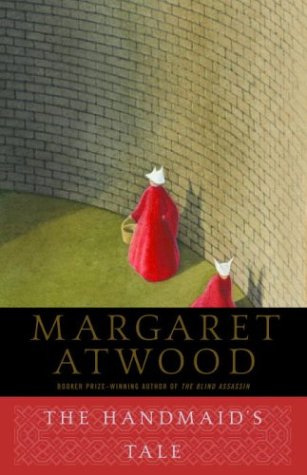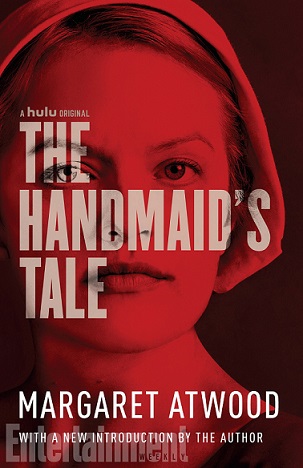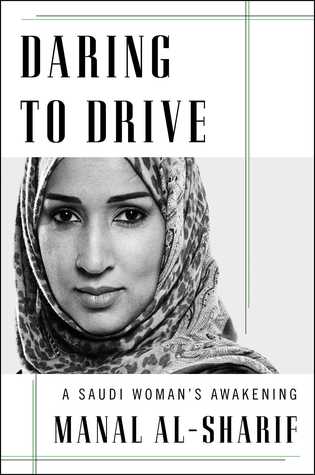Greetings. I hope some of you will get to see the upcoming solar eclipse in its totality. It should be quite something! Apparently the last time the U.S. saw a total solar eclipse was in 1979 and it won’t see one again until 2024. On Monday, the longest period that the moon will fully block the sun will be about two minutes and 43 seconds in Carbondale, Illinois. I will be in Vancouver, B.C., by then for the tennis nationals, but I’m sure to check out the sky on Monday at 10:21 a.m. for its maximum there, which apparently will be about 88 percent. Enjoy it, but don’t forget to wear the special eyewear to protect yourself. In the meantime, I’ll leave you with reviews of what I finished last week.

Ahh yes, I’m one of those who finished Season 1 of the TV series of “The Handmaid’s Tale” and then went back and read Margaret Atwood’s 1985 novel of it. I was curious to see how closely the series tracked to the original, and I was pleasantly surprised that in many ways the storyline honored the book very well. Both follow a totalitarian theocracy — the Republic of Gilead — that has taken over the U.S. and strictly controls women, forcing them out of jobs and money and into various classes, including the reproductive “handmaids,” who are denied all rights and coerced to produce babies for the elite barren couples.
You know the story. It tracks the life of Offred, who comes to be a handmaid for a top Commander and his wife in Cambridge, Mass. Part of it follows the oppressive life Offred leads living in the house as a handmaid to the Commander and in the community where resisters are hung dead from a Wall near the river, and the other half flashes back to Offred’s life years before, when she was married and had a daughter, and had a job and money — before Gilead. Oh it’s eerie stuff! Poor Offred remembers the good old days with her family, which are contrasted to the horrors of her current life under the totalitarian regime.
Of course, it’s the Commander and his wife, beacons of this society, who break the rules at whim. The Commander starts a secret relationship with Offred, spending evenings with her and taking her out to an underground club, and his wife, who wants Offred’s offspring, asks her to secretly have sex with their car attendant, Nick, believing her husband is infertile. It’s threatening stuff, and you don’t know who among Offred’s contacts can be trusted. Is Nick someone she can trust? Or will her old friend Moira, or Ofglen, a handmaid who is secretly part of the resistance, come to her aid? You won’t find out till the very end.
Atwood effectively writes it so at the onset you’re thrown into Offred’s circumstances, but you don’t exactly know what’s going on. The mystery and horror of the times sort of unfold as you go along. Atwood creates an atmosphere and a world that seem so scarily realistic you can easily believe it is happening. In fact, as she has said in interviews, there isn’t anything in the book not based on something that has already happened in history or in another country. She has said she took the idea for Gilead from the early Puritans “who came to America to set up a theocracy (like Iran) ruled by religious leaders,” where dissent within is not tolerated.

It’s a book that has been selling like hotcakes again ever since the U.S. election and the TV series came out. The series with Elisabeth Moss as Offred is quite well done and follows the storyline (as I said) pretty closely, but there are some differences. For one, it takes place in today’s world and appears more modern than you get from the book. Also Gilead in the TV series includes various races and orientations of people especially among the major characters, while the book’s society has removed non-whites and gays to faraway lands. Also the sequence of events in the book and the series differ, and secondary characters are much more fleshed out in the TV series. Whereas in the book, what happens is solely from Offred’s point of view, the series involves her husband Luke’s viewpoint as well as others. The characters of Luke, Nick, Ofglen, and Moira all have bigger roles in the series and some of their fates differ from what happens in the book.
Remember Rory from the Gilmore Girls? Well apparently the actress Alexis Bledel will continue as Ofglen in the upcoming Season 2, even though she died in the book. I must say the cast is superb, and it has a lively and surprising soundtrack. Also Elisabeth Moss, who is excellent as Offred, is more headstrong in the series. I think Season 2 will depart from the book since it was almost at the end of the book in the finale of Season 1 and heading that way — off-script.
Still Atwood has been involved with the show, and her very brief surprise cameo (in the pilot of episode 1) was great to see. It’s a bleak and disturbing storyline for sure, but you get hooked into pulling for the resistance every step of the way. It’s a series that champions the resistance and is perhaps why many have taken to the story in light of the Trump administration coming to power. As the secret Latin text carved into Offred’s floor translates: “Don’t let the bastards grind you down.”

If you doubt the oppression in Atwood’s “Handmaid’s Tale,” then you probably need to check out the second book I finished just yesterday. I listened for a week to Manal al-Sharif’s memoir “Daring to Drive: A Saudi Woman’s Awakening” as an audiobook and it made my blood boil among other things. The book, which came out in June, has made the rounds on the blogosphere and that’s where I heard about it. Of course, you might think you know about the restrictions and oppression happening to women in faraway places, but until you read a woman’s first-hand account there, you really don’t know up-close the magnitude of what’s going on.
Remember the news reports a few years back about a woman being arrested for having the gall to drive a car in Saudi Arabia? Well that was Manal al-Sharif. She became the unexpected leader of a movement to support women’s right to drive. It sounds a bit absurd right? She was thrown in prison for the transgression of “driving while female.”
While she starts her book with this episode of being taken in the middle of the night to prison, she thereafter goes back and tells her life story of growing up in Mecca a devout Muslim from a modest family. Her story of her Islamic fundamentalism and narrow-mindedness (her word) in the first half of the book are not always easy to listen to and I almost couldn’t wait to get to the second half of her memoir where her transformation takes place and she becomes more liberated and a female activist. Of course this all happens very gradually over time, certain things occur in her life that slowly change her perspective, including being forced by her parents to undergo a gruesome female circumcision when she was a teenager; going away to university, which opened her eyes; and watching the events of Sept. 11, 2001, unfold on TV.
Her ambition for a career and to help her parents financially were also factors in transforming her. Eventually she works her way up into getting a good job with Aramco, the state-owned oil company — yet like at every other stage in her life she ends running up against the Saudi rules of what women there are prohibited from doing. Just listening to all the minutia prohibiting women is staggering.
For instance, you always have to have a male guardian with you when you go outside, and you can’t drive yourself anywhere but need to use your paycheck to hire a taxi or driver to take you where you want to go, and you need to get permission to do things, like register for a class, or get an apartment, or have a male guardian sign for you on everything. Life there for women seems so much more complex, unjust, and time-consuming.
Manal’s account is both eye-opening and also uplifting in how she becomes transformed and persistent in her fight for women’s right to drive. As an activist, she eventually moves out of Saudi Arabia but still she is hopeful for a day when it will change there. I highly recommend her book, which reminded me of other powerful human rights memoirs such as Ayaan Hirsi Ali’s book “Infidel” and Malala Yousafzai’s book “I Am Malala.”

Lastly this past week, my husband and I went to see the Kathryn Bigelow film “Detroit.” Oh my, I almost didn’t make it through. For those who don’t know the movie takes place during the Detroit Rebellion of 1967 when the National Guard was called in to patrol the streets, and three young African American men were murdered at the Algiers Motel.
Midway through there is a section of about 40 minutes or so of a scene of white police brutality that is quite difficult to watch. It felt torturous, especially for how long it goes on. Eventually this scene ends and it turns into a court case against the officers over what happened. It’s far from an easy movie — it’s rather disturbing, but the filmmaking is quite vivid and powerful. You feel like you’re right there and can feel the heat and the tension. At times it seems it’s shot from a hand-held camera that’s bouncing around from the chaos and violence on the streets. You get to know what happened to these real people who were caught up at the Algiers Motel that night. Gosh it would change their lives and the history of the city’s forever. Despite some of its difficult viewing, I’m glad I saw the movie and think it will be nominated for some awards by the end of the year.
What about you — have you read or seen any of these that I reviewed — and if so, what did you think?

Well, you know I re-read The Handmaid’s Tale. I still have not watched the series because I had to re-read 1984 for another reading group meeting. Bleak!! I forgot how bleak it is.
I love all of your reviews here. I will read the Daring to Drive book and see the Detroit movie. I arrived at University of Michigan in Ann Arbor in the fall of 1967, just after the riots. I became a full hippy, we hated the “pigs” and we worked on Civil Rights. I must see that movie!
Good luck on the tennis tournament! I will be at lunch with some friends on Monday, celebrating my birthday, which is today! I am 70, OMG. Anyway, I don’t know how much of an eclipse we will get this far south but I am excited.
Hi Judy: Enjoy your bday lunch & eclipse day. Let me know what you think of Detroit; pretty potent. And HT tv version. You became a hipster right at the right time.
I’m going up to Wyoming (from Colorado) along with the rest of my state for the eclipse. That’s the plan anyway.
I have a copy of Handmaid’s Tale, left unread for years, but your excellent review has got me thinking that I will actually read it. I like Elizabeth Moss and will probably end up watching the series at some point too.
Daring to Drive also sounds excellent–interesting that she is hopeful that things will change in Saudi Arabia. It seems that we had a bit of a pendulum swing the other way, but now I’m not so sure.
Great post!
Hi thanks Jane! Enjoy the eclipse. I think my brother is going to Wyoming as well for it. It should be quite a sight there! I’m glad I finally got to Handmaid’s Tale as it had been on my shelf for years too. Daring to Drive is a bit remarkable for the transformation she goes thru in her life. It’s enlightening too.
ps. The Daring to Drive author talks about the Arab Spring and I think it gave hope to the women there — but it seems still not enough has happened for them; maybe things became tighter in reaction?
The Handmaid’s Tale is such a good, important but disturbing book. Though I have read it twice in the past and I am a fan of the older film version, I have refrained from watching the new series. I have stayed away from the new series as it seems like it will likely disturb me. I will eventually bite the bullet and give it a watch.
I really need to read daring to drive. I have chatted with several Saudi women on social media. Many are participating in Twitter hashtag campaigns such as #StopEnSlavingSaudiWomen. The oppression if women n that nation is shocking, insane and disturbing.
Hi Brian, thanks for letting me know about the Saudi campaigns on Twitter. I really hope that society in Saudi will bust wide open — giving women much more freedom there! I thought The Handmaid’s Tale was masterfully done as a book and I should probably look for the old film version. Not totally sure if you will like the new series / it’s a bit more modern but give it a go sometime.
We are in the path of totality and people are already pouring in to see the eclipse.
I love The Handmaid’s Tale and will try to get to Daring to Drive soon – I think I have it in print.
Hi Kathy, Enjoy your eclipse day; it sounds like it will be crazy there. Yeah I’d be interested to hear what you think of Daring to Drive. It’s good too on audio but is not the author who reads it.
I’m going to read both, The Handmaid’s Tale and Daring to Drive at some point. I will also be watching Detroit; I read another, besides yours, good review on it, and now I can’t wait for it to be released on rental. If your interest is still piqued about the plight of women under theocratic regimes, like Iran’s, then I recommend you find on Netflix the movie “The Stoning of Soraya M.” It’s not an easy watch, but it will add to this theme you have going on this week: oppression on women, theocratic regimes, societal brutality, and so on.
Hi Carmen, ha yeah I covered a lot of oppressive themes this past week. Good grief: the harshness of it! I need to add some lightness. But thanks for letting me know of the Stoning movie — sounds rough. I can only hope that with a lot of work (inside & out) that the plight of these women in these countries will change! It must. Even the internet played a role in helping the author of Daring to Drive.
I read The Handmaid’s Tale years ago, but still haven’t watched the series. I need to get on that! Daring to Drive has been my favorite nonfiction so far this year. I also listened on audio and I think the wonderful narration by Lameece Isaaq was a big part of the pleasure.
Hi Susie, Yeah I might have heard about Daring to Drive from you & others, so thanks for your recommendation on it. I learned quite a bit from it and the author gave me hope that things might change there, hopefully sooner rather than later. The audio was good.
I read The Handmaid’s Tale twice…once many years ago, and the second time, in recent years. I saw and loved the TV show…and as movies always do for me, the film brought out events so vividly, I felt I was experiencing it all with them. And I was very afraid, living in our current political atmosphere. Nothing is beyond the realm of possibility.
The book Daring to Drive is now on my list. I love any kind of book and/or film that features people resisting oppression.
Thanks for sharing!
Hi Laurel, it’s nice that we are experiencing the TV series of the HT together! And have read the book. It’s quite disturbing indeed. As for Daring to Drive, I think you would like it. It’s a personal story and an effective one! thanks for stopping by.
Thank you for this amazing post, Susan. I am scared to read ‘The Handmaids Tale’. Every time I read a compelling review, I would be motivated to read the book, but something keeps stopping me. I hope I will be ready soon. ‘Daring to Drive’ sounds like an important book. I am surely adding it to my TBR.
Hi Deepika, thanks much for your kind words! Have they showed the Handmaid’s TV series there? It’s pretty scary but I was able to get through Season 1. The book unfolds slowly so it is manageable in a creepy way. I agree Daring to Drive is important. I only hope her dreams for Saudi Arabia come true. Check it out if you get the chance.